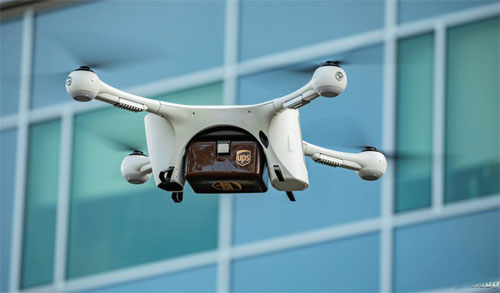In the healthcare environment, life and death can come down to a matter of minutes — even seconds. On a large medical campus, such as the one at University of Utah Health, the delivery of medical samples, instruments, supplies, drugs and human tissue can take up a lot of that valuable time. Currently, the bulk of UofU Health intra-campus deliveries are made by courier cars.{mprestriction ids="1,3"}
But that’s going to change. UPS has announced that it will launch its Flight Forward service on the UofU medical campus using drone flights for delivery of critical materials between the institution’s various hospitals, clinics and supply depots. The UofU launch will be the first for UPS following its Flight Forward pilot program at WakeMed’s flagship hospital in Raleigh, North Carolina.
The WakeMed program announced in March marked the first FAA-sanctioned use of a drone for routine revenue flights in the U.S. In September, UPS’s drone airline subsidiary, UPS Flight Forward, received the first-ever FAA Part 135 certification, which gives UPS the flexibility to rapidly scale hospital operations. More than 1,500 flights have been completed on the WakeMed campus since operations began there in earlier this year.
Drone transportation for healthcare logistics creates substantial opportunities for enhanced patient care and cost savings, according to a joint release from UPS and University of Utah Health. Drones provide capability for on-demand delivery, the ability to avoid roadway delays, increase medical delivery efficiency and improve the patient experience with potentially life-saving benefits.
“University of Utah Health’s drone delivery program will provide many benefits, including patient convenience, reduced delivery times and support for the Utah Clean Air Partnership by reducing vehicle traffic,” said Gordon Crabtree, CEO of University of Utah Hospitals & Clinics. “It’s extremely exciting that we are on track to launch Utah’s first functioning drone delivery program. Not only are we committed to providing innovative and quality care to our patients, but we are committed to improving Utah’s air quality by being on the forefront of this new technological frontier. We look forward to this exciting collaboration with UPS.”
“UPS is rapidly expanding drone delivery, next-generation tracking tools and other technologies to help the healthcare industry solve logistics problems, enhance efficiency and deliver improved patient outcomes,” said Scott Price, chief transformation and strategy officer at UPS. “We are transforming the company’s Smart Global Logistics Network by using the latest innovation to bring new value to customers.”
Flight operations at UofU Health will be geared toward building out a more cost-efficient medical delivery system as the campus undergoes tremendous growth. New medical construction includes the institution’s new Acute Care Center, Craig H. Neilsen Rehabilitation Hospital and Sugar House Health Center. The addition of drone logistics will help establish an environmentally responsible, short-range transportation solution in support of the state’s Utah Clean Air Partnership, the university said.
University of Utah Health hails itself as the Mountain West’s only academic healthcare system, which provides care for Utahns and residents of five surrounding states. With more than 5,000 healthcare professionals in the network, drones can enable staff to focus more on care services instead of courier services and better support rural-area healthcare needs as drone transportation services expand. The UofU Health system includes 12 community clinics and four hospitals: University Hospital, University Neuropsychiatric Institute, Huntsman Cancer Hospital and the University Orthopaedic Center.
Standard transport protocols will include medical professionals packing a secure drone payload container with medical items. The drones will then fly autonomously along a predetermined flight path to its delivery point.{/mprestriction}








